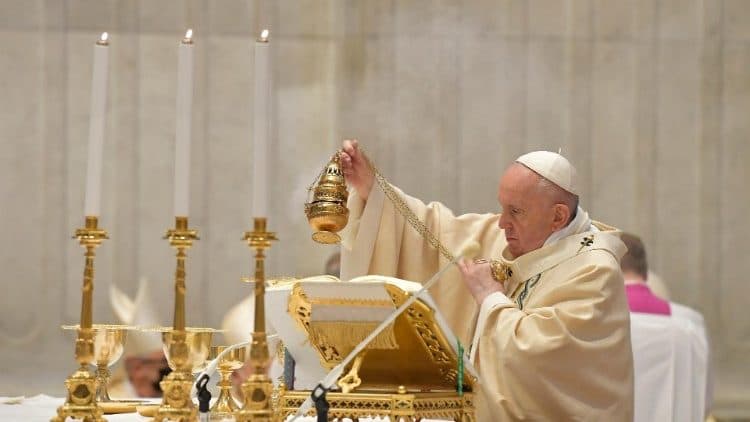As our life of prayer includes so many different movements of the heart, it shouldn’t surprise us that our prayers of intercession lead us to prayers of thanksgiving. Even as we wait for God to answer the petitions of our intercession, we are filled with gratitude for a God who loves us and listens to us.
Gratitude can be defined in many ways. Perhaps most simply, we can say that gratitude is a prayerful pause we take in order to review the landscape of our lives and acknowledge an act of loving kindness or compassionate care that has been given to us.
The Catechism of the Catholic Church observes: “Thanksgiving characterizes the prayer of the Church which, in celebrating the Eucharist, reveals and becomes more fully what she is.”
Even as we offer our personal prayers of gratitude, the entire Church – the full Body of Christ – is defined by her public prayers of thanksgiving in the Eucharistic Sacrifice. The worship of the Church is called by many names, including eucharist, which is Greek for thanksgiving.
The Catechism continues: “Indeed, in the work of salvation, Christ sets creation free from sin and death to consecrate it anew and make it return to the Father, for his glory. The thanksgiving of the members of the Body participates in that of their Head.”
We are most united to Jesus Christ when we humble ourselves and give thanks. It is no mistake that the central and preeminent action of the Body of Christ – its summit and source – namely, the offering and participating in the eternal sacrifice of the Lord Jesus to the Father by the power of the Holy Spirit, is named and placed under the designation eucharist, “thanksgiving.”
The Church, therefore, identifies her worship and way of life with the heart-warming, countercultural, and life-giving virtue of gratitude. Without question, it is gratitude that gives life to the Body of Christ. It is gratitude that invigorates us and leads us to deeper prayer, especially when we not sure what’s happening or why things have not gone as we had hoped.
In designating our worship under the name of thanksgiving, the Church emphasizes for us that the heart of true prayer beats with gratitude. As in the sacred liturgy, so in our own hearts. We are a people who are summoned and called to give thanks to God. Our prayer peaks and soars when it is attuned to gratitude.
The Catechism teaches us: “As in the prayer of petition, every event and need can become an offering of thanksgiving.”
As believers, we thank God in times of joy, triumph, and success. We also give thanks to him in times of sorrow, distress, and heartbreak. We also give thanks to God in times of confusion and uncertainty. We give thanks to God in all areas and in every aspect of life in a good, fallen, and redeemed world.
Our acts of thanksgiving are not limited to only good times or to the moments when we get what we want. Our thanksgiving is not an extension of some sort of self-centeredness or selfishness. We thank God even when – and especially when – things are tough and confusing.
By turning to gratitude, we are lifted up by God’s grace. We are able to see God’s presence and providence everywhere and in all state of affairs. Gratitude frees the heart and open our spiritual eyes.
The Catechism continues: “The letters of St. Paul often begin and end with thanksgiving, and the Lord Jesus is always present in it: ‘Give thanks in all circumstances; for this is the will of God in Christ Jesus for you’; ‘Continue steadfastly in prayer, being watchful in it with thanksgiving.’”
The Apostle of the Gentiles modeled a life of gratitude for us. He thanked God at all times and he invites us to do the same.
Any Christian would be hard-pressed to argue why a life of gratitude is not the way of the Lord. As followers of the Lord Jesus, who gave constant thanks to the Father, and as members of the Church whose central moment of worship is literally called “thanksgiving,” we are called out of the darkness of self-pity, entitlement, and bitterness and welcomed into the light of gratitude, goodness, and peace. And the first step into the light is gratitude.
Gratitude is the wellspring and source of life for a soul that wants to live in the presence and grace of God. There is no understanding of love, or prayer, or even life itself without the humility of gratitude and the spiritual sight it gives us.
Follow Father Kirby’s free daily reflections at Daily Discipleship with Father Kirby.















